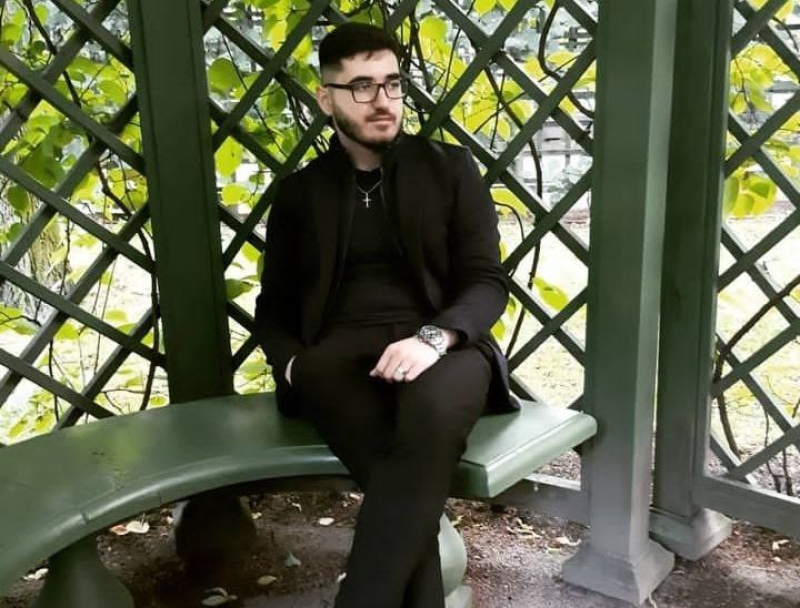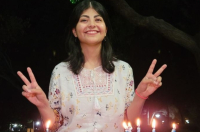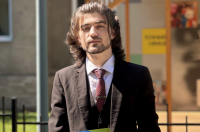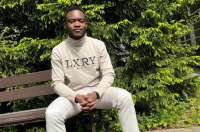Please tell us something about yourself.
I am Elvis from Albania. I graduated from ITMO this year with a Bachelor’s degree in mechatronics and robotics. Currently, I am a first-year student of the Master's program Digital Technologies in Manufacturing.
Introduce us to Albania.
Albania is a southeast European country located in the Balkan region. It shares its borders with Greece, North Macedonia, Serbia, and Montenegro. One unique fact about my country is that it has a very authentic Balkan culture with a unique language.
What is so unique about it?
The Albanian language, which we call shqip, is not related to any of the languages spoken in the neighboring countries. Albania itself is a foreign name – in our language, we call our country Shqipëria, which translates to the land of eagles.
How would you describe the people of your country?
Albanians are very conservative, friendly, and hard-working. With foreigners, we are even more friendly and welcoming because we have a tradition which mandates that guests must be respected. We treat them as a part of our family. And if someone fails to serve the guests well, they are looked down upon by the society.
Can you name some of the tourist attractions in Albania?
There are many places worth visiting in my country. To begin with, the place where I come from is located near the Albanian coastline and it is well-known for its rocky beaches and the clean water of the Mediterranean Sea. My city is famous for being the point of confluence of the Adriatic Sea and the Ionian Sea. There are also popular historic places that remain from times of the Roman and Byzantine empires. Many places in Albania still have traces of the Ottoman Empire, too.
What is the most important festival in your country?
Albania is a multi-religious country where Muslims, Orthodox Christians like myself, and Roman Catholics live together in harmony. What binds us together is the fact that we all are Albanian and there is mutual respect for one another. So, we have many religious festivals.
But the main day of celebration for Albanians is the day of its independence from the Ottoman Empire, i.e. November 28, 1912. Another one is November 29, 1944, which marks our country’s liberation from Nazi Germany. These two national holidays are celebrated throughout Albania with great pride and enthusiasm.
Is there a traditional Albanian dish that makes you nostalgic?
It is difficult for me to answer this question because I don’t know what qualifies as Albanian food. At my home, we only cook Italian dishes. In other households, you might find Greek or Turkish cuisine being prepared more often. So, our cuisine is quite mixed. Food in the Balkan countries is usually the same with different names.
Let’s now talk about academics. What motivated you to come to Russia?
First of all, I always had the desire to come to Russia, learn the language and possibly live here. When I was in school, a delegation from the Russian embassy visited us to tell us about scholarships and higher education opportunities in Russia. I was quite fascinated by their presentation and I immediately decided to grab this opportunity.
Why did you decide to study mechatronics and robotics?
Let’s say I was born to be an engineer. I can’t do anything else. I really like mechanics and robotics, but in particular, I have a fascination with building ships. My family has a rich history of being associated with ships. Both my mother and father are mechanical engineers. My father works on a ship and my grandfather used to work on a Russian submarine.
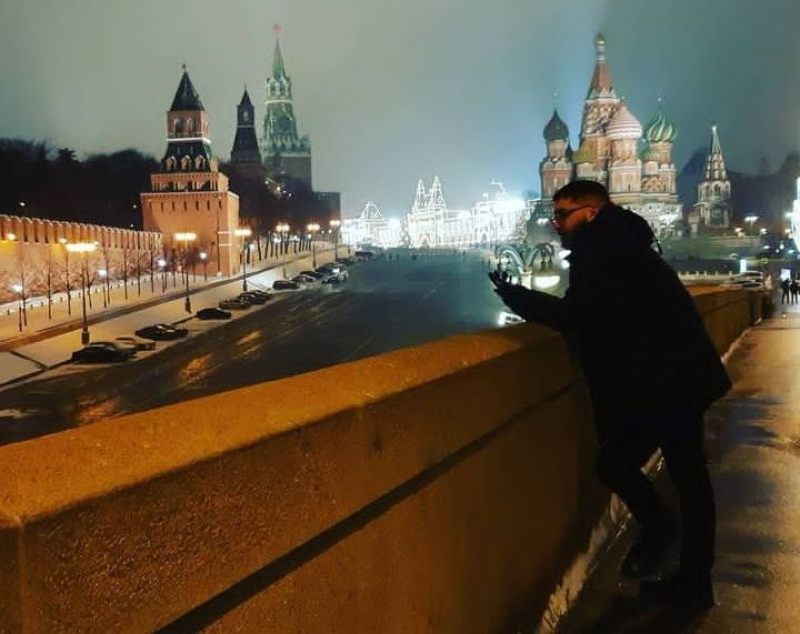
“I have been to Moscow many times because my sister is pursuing a PhD there,” says Elvis. Photo courtesy of the subject
What do you think about the learning environment at ITMO?
Honestly, it is different because most of the universities in Russia follow the old education system. I am used to the old one because the Albanian system has Soviet roots. But at ITMO, there is more academic freedom. We have more options when it comes to choosing subjects and also more free time to pursue our hobbies.
Were you a part of the Foundation Program?
Yes, of course. I had to go through the Foundation Program because when I was in Albania, I could learn no more than a few words of Russian. Most of my Russian learning journey happened at ITMO. I learned the language very easily because I always had a wish to do so.
Are you a part of any ITMO club?
My friends and I decided to start a club at ITMO called Клуб землячеств (“Club of nations” – Ed.). We help new international students settle down in St. Petersburg and introduce them to every small thing like shopping for groceries, opening a bank account, getting a student card, translating documents, and the like.
We not only help them out but also make them feel at home. We pair new students with someone who belongs to their country or at least is from a similar region. For example, I am responsible for every student who comes to Russia from the Balkan region. We also celebrate regional festivals and occasions to help the new students feel familiar by creating an environment that they are used to. This way, they are less homesick and ready to adapt to the new country quicker.
How many years have you been in Russia now?
I have been in this country for more than five years now. Very soon, it will be six years of living in the Russian Federation!
What do you think about St. Petersburg?
The city is amazing! I have been to many historic cities, but right now this is the one that I love the most. I really like the historic monuments here like the Kazan Cathedral, the Church of the Savior on Spilled Blood, the Hermitage, the Peter and Paul Fortress, the Cruiser Aurora Museum, and the Summer Palace. I also like the parks here. They are very beautiful.
Is the weather in St. Petersburg similar to your hometown?
My city has a Mediterranean climate and the coldest it can get is around 5℃. But that is only for just one day. But now I am used to the cold weather here and I like it. It is much better than 35℃-40℃.
Any advice for keeping yourself warm in the winter?
Have some spare clothes with you all the time. If you get sweaty, you need to change immediately. Always remember to cover your neck and nose. Never breathe the icy-cold air directly. If you feel cold after you reach home, just immerse your feet in hot water for some time. It will help you get rid of the cold immediately.
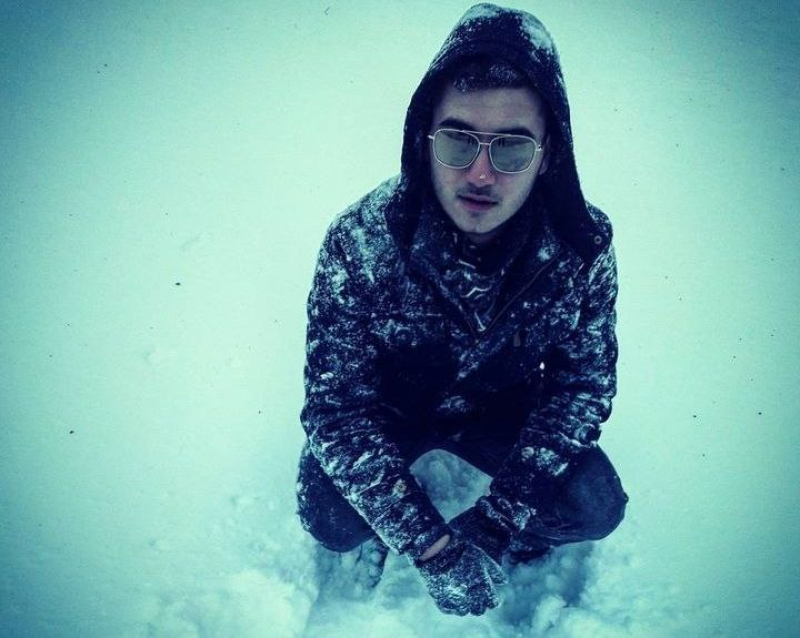
“Once you know how to dress properly, you will be able to easily survive Russian winter,” says Elvis. Photo courtesy of the subject
Do you enjoy Russian cuisine?
Yes, I really like Russian food. Borscht is my favorite.
Where do you see yourself in the next 2-3 years?
In two years, I will finish my Master’s program and, hopefully, I will get a job here in Russia. Hence, I would have a pretty good reason to continue living here. However, I don’t know what is in store for me after that. We will see.
What would your advice be for future ITMO students?
My advice would be to learn Russian as soon as possible. Everything will be easier for you if you know the language. It is not only for Russia, but any foreign country that you go to. Knowing the language will make you closer to the natives and your life will be much smoother.
Let’s end today’s conversation with a few rapid-fire questions:
-
What is your favorite city in Russia? I have been to both Moscow and St. Petersburg, but I like St. Petersburg more because the lifestyle here is very healthy. People here are less stressed and not always on the run like in Moscow. Also, St. Petersburg is less crowded than Moscow.
-
Any city in Russia that you would like to visit in the future? Actually, there are quite a few. Volgograd, Murmansk, Vladivostok, Ussuriysk, Ufa, Yekaterinburg, Novosibirsk, Rostov-on-Don, Khabarovsk, Sochi, Smolensk, and the Golden Ring cities are some of the main ones.
-
Have you started eating grechka (buckwheat)? Well, if I am running late and I quickly need something to eat, then grechka would be my go-to meal.
Note: We interviewed Elvis two years ago as well. Read his previous interview to find out how he has grown over the years at ITMO.
